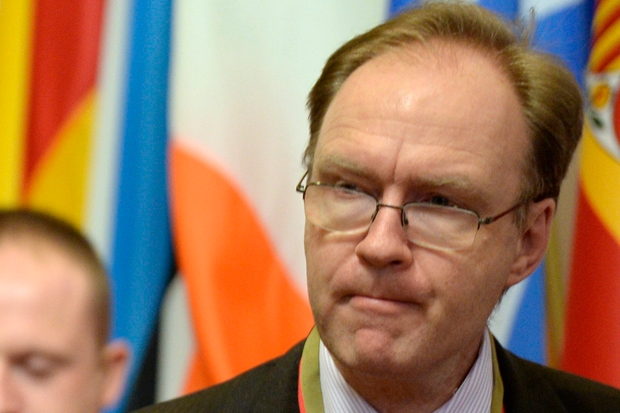The wonder about Sir Ivan Rogers’s resignation as Britain’s ambassador to the EU is that he was still in the job. He may have possessed useful knowledge about the workings of the EU, but he was also heavily associated with a failed way of conducting negotiations with it. It was he who advised David Cameron last February on his unsuccessful renegotiations of Britain’s relationship with the EU, which failed to convince the British people to vote to remain in the union. It would have been better and less disruptive had he resigned in the wake of the referendum last June, along with the Prime Minister.
That Sir Ivan was not the man to work on Brexit negotiations is clear from the email he sent to colleagues as he resigned, and which it is impossible to believe that he did not intend to be leaked. ‘I hope you will continue to challenge ill-founded arguments and muddled thinking,’ he wrote, ‘and that you will never be afraid to speak the truth to those in power.’
A diplomat should not be briefing against the government. What he sees as the ‘truth’ is really nothing more than his opinion. While it was his job to give that opinion, it is a sign of arrogance that he saw it as more than that. Throughout the referendum campaign, and the Remain campaign rearguard operation which has followed it, we have repeatedly seen opinion elevated to the status of fact. It was beyond question, we were told by George Osborne, that the Treasury’s analysis of a severe and instant hit to the economy in the event of a vote for Brexit was correct. As subsequent events have proved, it was anything but.
Sir Ivan’s arrogance became notorious among government aides who worked alongside him during David Cameron’s renegotiations. He made it clear that he regarded politicians and their advisers as his intellectual inferiors, would dismiss their ideas as impossible and was constantly saying he would walk out if he didn’t get his way. As one aide reportedly said: ‘I’ve lost count of the number of times Ivan threatened to resign.’ What emerges is a picture of a man who was personally hostile to the prospect of Britain leaving the EU and who could not hide it — when of course his role required him to be neutral.
Following the Brexit vote, Sir Ivan continued to show his hostility to the job with which he was tasked. It is believed to be he who advised Theresa May to try to use the three million nationals of other EU states already living in Britain as bargaining chips in the negotiations. It was a disgraceful idea which plays with the lives of people who have set up home and established careers in Britain. Even Ukip had made it clear that Brexit would not mean picking on EU nationals and threatening them with mass deportations — that would in any case be against international law. What was going through Sir Ivan’s mind when he developed this negotiating strategy we cannot know, but all it would achieve was to make Brexit look like the nasty, xenophobic process which its chief opponents try to paint it as.
Throughout, Sir Ivan has presented an air of negativity. Last month he briefed the government that it could take ten years to complete a deal to secure Britain’s long-term relationship with the EU. True, trade deals can take a remarkably long time, but given that Britain is not starting from scratch, and already has a trading relationship with the EU, his claim showed an irrational negativity towards the whole Brexit process. Why should it take so much longer to negotiate a member state’s withdrawal from the EU than it took to negotiate the single market and single currency in the first place?
If you are going to set out with the view that negotiations will take ten years, it might well become a self-fulfilling prophecy. But surely if renegotiations were showing signs of taking remotely that long we ought to be walking away from them, conducting trade with the EU through established World Trade Organisation (WTO) rules and concentrating our efforts instead on doing trade deals with countries outside the EU like India and China, which have already expressed their desire to open up trade with Britain.
This comes down to Sir Ivan’s biggest failing. He subscribes to what has been the Foreign Office’s philosophy throughout Britain’s 44-year membership of the EU: that deals must be struck, treaties signed off, come what may. The irony is that a man who has spent the past year constantly threatening to walk out on his job could never bring himself to walk away from the EU negotiating table. Summit after summit, often late in the night, Britain signed up to things it didn’t want just to satisfy the expectation that some kind of deal be struck before dawn broke and entourages had to head for the airport.
Sir Ivan’s departure has been presented by his friends as some kind of tragedy, and Sir Ivan as irreplaceable. But there are many civil servants who could do his job better than he did. It is not a Brexit enthusiast who is needed to replace him, as some have suggested, but a public servant who does not brief against the government and who is prepared to enter these negotiations in a positive mindset. Above all, we need someone who takes the view that if we cannot get a deal that is acceptable to us, then the best option may be to walk away, resort to WTO rules and focus on opportunities with growing economies elsewhere in the world.






Comments